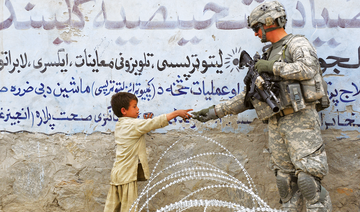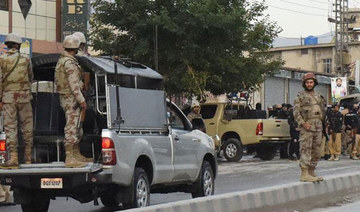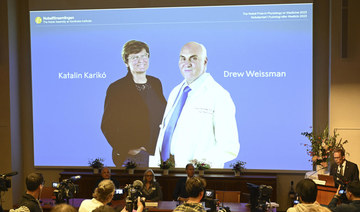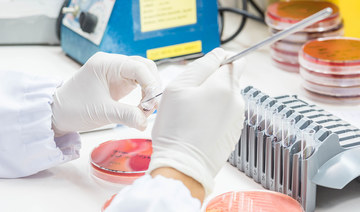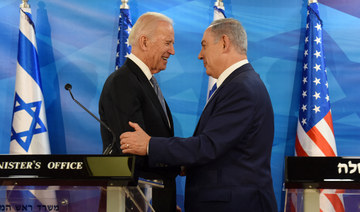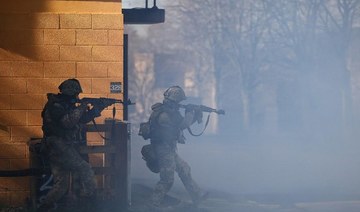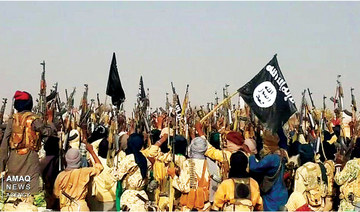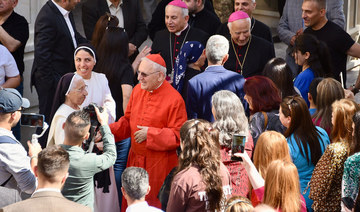KABUL: Gunmen killed a former Afghan TV presenter on Thursday as he was traveling in the southern city of Kandahar, a provincial official said, adding to fears for press freedom in the war-wrecked country.
Nimat Rawan was shot at noon, provincial spokesman Baheer Ahmadi said, by two assailants who were able to escape with his mobile phone.
Security officials have told several other journalists in the area that extremists are targeting them as well, he added.
The killing heightens worries over the fate of Afghan journalists as US troops pullout. Many fear violence will spike and reprisals will be taken out against those who worked with foreign forces.
Rawan was a former presenter for the well-known local channel Tolonews. He had been working in the Finance Ministry’s media office, media watchdog Nia said in a statement.
No one immediately claimed responsibility for the attack, but it comes a day after the Taliban issued a threat to Afghan journalists it considered too close to US-backed security agencies.
In a statement, Taliban spokesman Zabihullah Mujahid warned Afghan journalists against giving “one-sided news in support of Afghanistan’s intelligence,” or otherwise “face the consequences.”
Afghanistan is considered one of the most dangerous countries in the world to be a journalist. Since 2006, as many as 76 journalists have been killed in Afghanistan, according to UNESCO.
Last year alone at least 15 were killed, and earlier this year, three women employed by media outlets were killed in eastern Afghanistan. The Daesh group has claimed responsibility for some of the killings, including that of the three women. The majority of the targeted journalists have been women.
The government blames a resurgent Taliban — who now control or hold sway over half the country — for many of the targeted killings. The insurgents, meanwhile, claim the Afghan intelligence service is carrying out these attacks so as to blame the Taliban.
Gunmen kill former TV presenter then escape in Afghanistan
https://arab.news/ng2r9
Gunmen kill former TV presenter then escape in Afghanistan
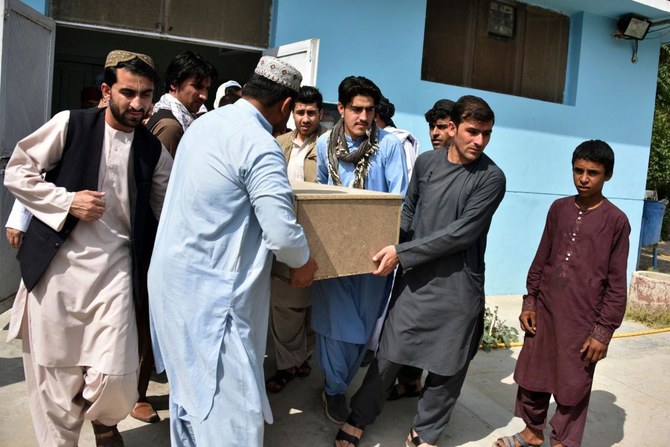
- Former TV present Nimat Rawan was shot at noon by two assailants who escaped with his mobile phone
- Security officials have told several other journalists in the area that extremists are targeting them as well
A Russian deputy defense minister is ordered jailed pending trial on bribery charges
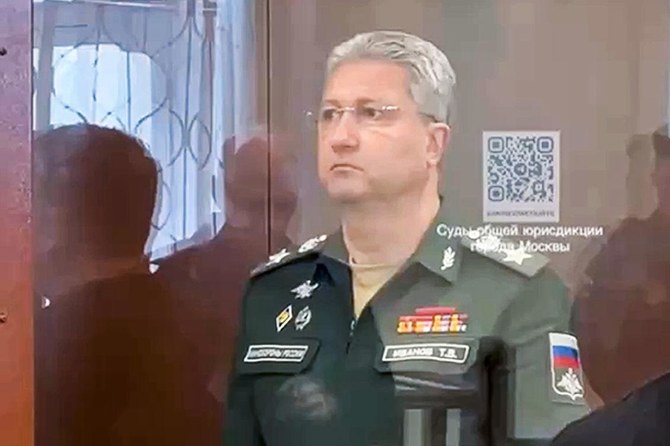
The committee gave no further information, apart from saying Ivanov is suspected of taking an especially large bribe — an offense punishable by up to 15 years in prison
MOSCOW: A Russian deputy defense minister in charge of military construction projects and accused of living a lavish lifestyle was ordered jailed Wednesday pending an investigation and trial on charges of bribery, court officials said in a statement.
Timur Ivanov, one of 12 deputy defense ministers, appeared in Moscow’s Basmany court Wednesday wearing his military uniform. The ally of Defense Minister Sergei Shoigu was arrested Tuesday evening, Russia’s Investigative Committee said in a statement.
The committee gave no further information, apart from saying Ivanov is suspected of taking an especially large bribe — an offense punishable by up to 15 years in prison.
The Kremlin rejected some Russian media reports that Ivanov was suspected of treason.
Ivanov, 48, was sanctioned by both the United States and European Union in 2022 after Russia’s full-scale invasion of Ukraine.
According to a court statement, investigators told the judge that Ivanov had conspired with third parties to receive a bribe in the form of unspecified property services “during contracting and subcontracting work for the needs of the Ministry of Defense.”
An acquaintance of Ivanov’s, identified as Sergei Borodin, also was arrested and ordered jailed pending an investigation and trial on the same charges, court officials said. Both men are to remain in custody until at least June 23.
According to the Defense Ministry’s website, Ivanov was appointed in 2016 by a presidential decree. He oversaw property management, housing and medical support for the military, as well as construction projects.
Russia’s state news agency RIA Novosti quoted Kremlin spokesman Dmitry Peskov as saying that Shoigu and President Vladimir Putin were informed of Ivanov’s arrest, which comes as Moscow’s war in Ukraine grinds through its third year.
Peskov dismissed Russian media reports that the corruption allegations against Ivanov were intended to obscure additional allegations of high treason.
Independent Russian news outlet reported that the bribery charges were intended to hide more serious charges of treason and avoid scandal, citing two unidentified sources close to the Federal Security Service, or FSB.
Peskov described the reports as speculation. “There are a lot of rumors. We need to rely on official information,” he told journalists.
Ivanov’s lawyer also denied any other charges, telling RIA Novosti that he faced only bribery allegations.
Before his arrest, Ivanov was seen attending a meeting with Shoigu and other military brass.
Russian media reported that he oversaw some of the construction in Mariupol — a Ukrainian port city that was devastated by bombardment and occupied by Russian forces early in the war.
Zvezda, the official TV channel of the Russian military, reported in summer 2022 that the ministry was building an entire residential block in Mariupol and showed Ivanov inspecting construction sites and newly erected residential buildings.
That same year, the team of the late Alexei Navalny, Russia’s most prominent opposition leader and anti-corruption campaigner, alleged Ivanov and his family had been enjoying luxurious trips abroad, lavish parties and owning elite real estate. The activists also alleged that Ivanov’s wife, Svetlana, divorced him in 2022 to avoid sanctions and continued living a lavish lifestyle.
Commenting on Ivanov’s case, Navalny’s ally Maria Pevchikh said on social platform X: “It’s a good day today.”
The prosecution of high-level officials for corruption remains relatively rare in Russia.
The most recent arrest in April 2023 saw former Deputy Culture Minister Olga Yarilova charged with embezzling more than 200 million rubles ($2.2 million). Yarilova, who held her post between 2018 and 2022, is on trial and facing a seven-year jail term.
Former Economics Minister Alexei Ulyukayev received an eight-year prison sentence in 2017 for accepting a $2 million bribe from one of Putin’s top associates. The high-profile trial was widely seen as part of infighting between Kremlin clans. Ulyukayev, now 68, was granted early release from prison in May 2022.
Vaccines save at least 154 million lives in 50 years: WHO
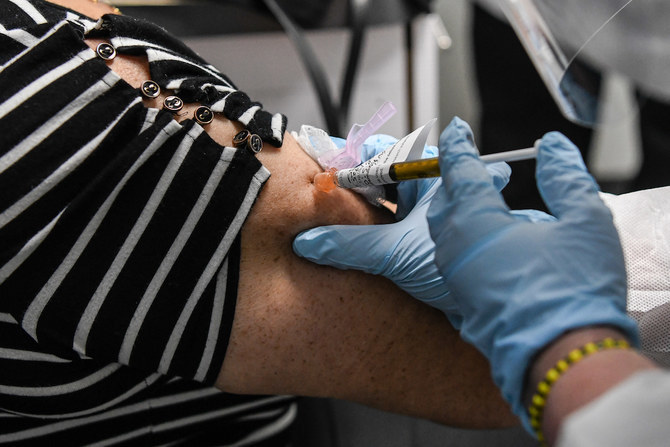
- That is the equivalent of six lives saved every minute of every year of the half century, the UN health agency said
- “Vaccines are among the most powerful inventions in history, making once-feared diseases preventable,” WHO chief Tedros Adhanom Ghebreyesus said
GENEVA: Global immunization efforts have saved at least 154 million lives in the past 50 years, the World Health Organization said Wednesday, adding that most of those to benefit were infants.
That is the equivalent of six lives saved every minute of every year of the half century, the UN health agency said.
In a study published in the Lancet, WHO gave a comprehensive analysis of the impact of 14 vaccines used under the Expanded Programme on Immunization (EPI), which celebrates its 50th anniversary next month.
“Vaccines are among the most powerful inventions in history, making once-feared diseases preventable,” WHO chief Tedros Adhanom Ghebreyesus said in a statement.
“Thanks to vaccines, smallpox has been eradicated, polio is on the brink, and with the more recent development of vaccines against diseases like malaria and cervical cancer, we are pushing back the frontiers of disease,” he said.
“With continued research, investment and collaboration, we can save millions more lives today and in the next 50 years.”
The study said infants accounted for 101 million of the lives saved through immunization over the five decades.
“Immunization was the single greatest contribution of any health intervention to ensuring babies not only see their first birthdays but continue leading healthy lives into adulthood,” WHO said.
Over 50 years, vaccines against 14 diseases — diphtheria, Haemophilus influenza type B, hepatitis B, Japanese encephalitis, measles, meningitis A, pertussis, invasive pneumococcal disease, polio, rotavirus, rubella, tetanus, tuberculosis, and yellow fever — had directly contributed to reducing infant deaths by 40 percent, the study found.
For Africa, the reduction was more than 50 percent, it said.
The vaccine against measles — a highly contagious disease by a virus that attacks mainly children — had the most significant impact.
That jab accounted for 60 percent of the lives saved due to immunization, according to the study.
The polio vaccine means that more than 20 million people are able to walk today who would otherwise have been paralyzed.
The study also showed that when a vaccine saves a child’s life, that person goes on to live an average of 66 years of full health on average — with a total of 10.2 billion full health years gained over the five decades.
“These gains in childhood survival highlight the importance of protecting immunization progress,” WHO said, pointing to accelerating efforts to reach 67 million children who missed at least one vaccination during the Covid pandemic.
Sunak, Scholz vow support for Ukraine for ‘as long as it takes’
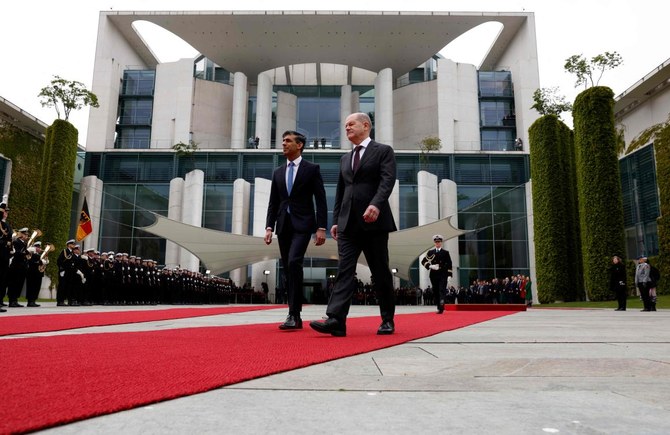
- “We’re defending the values that are incredibly important to us,” the UK leader added
- Sunak embarked on a two-day trip to Europe designed to get the spotlight back on Ukraine after months of world attention on Israel’s war against Hamas in Gaza
BERLIN: The leaders of Britain and Germany pledged Wednesday to back Ukraine in its war with Russia for “as long as it takes,” but the German chancellor doubled down on his refusal to deliver long-range Taurus missiles to Kyiv.
UK Premier Rishi Sunak was on his first trip to the German capital since becoming prime minister 18 months ago, after visiting Poland on Tuesday where he pledged additional money for Kyiv and announced plans to boost UK defense spending.
“We’re united on wanting to support Ukraine for as long as it takes,” Sunak told reporters, adding that Russian President Vladimir Putin’s aggression must “end in failure.”
“We’re defending the values that are incredibly important to us,” the UK leader added, standing alongside German Chancellor Olaf Scholz during a press conference at Germany’s chancellery.
Sunak embarked on a two-day trip to Europe designed to get the spotlight back on Ukraine after months of world attention on Israel’s war against Hamas in Gaza.
In Poland, he pledged an additional £500 million ($617 million) for Ukraine, taking the amount of money the UK has contributed to Ukraine’s war effort to £12 billion.
Kyiv has been pleading with allies to ramp up supplies of ammunition and air defenses desperately needed to repel relentless Russian attacks.
US lawmakers eased the pressure last weekend by unblocking a $61-billion military aid package for Kyiv following six months of political wrangling.
But EU defense and foreign ministers insist that Europe must still speed up its deliveries of arms to Ukraine.
Germany has answered Kyiv’s call in recent days by saying it would send an extra Patriot air defense system to Ukraine.
But Scholz again resisted calls to send long-range Taurus missiles, which Ukraine desperately wants but which Germany fears would escalate the conflict.
“My decision is very clear” on not sending the Taurus, said Scholz.
“But my decision is also very clear that we will continue to be the biggest supporter of Ukraine in Europe,” he added.
Sunak hailed “a new chapter” in relations between Britain and Germany as they announced plans for a joint endeavour to develop remote-controlled Howitzer artillery systems that will be fitted to Boxer armored vehicles.
“At this dangerous moment for the world, the UK and Germany are standing side by side to preserve security and prosperity at home and across our continent,” Sunak said before landing in Berlin.
In Warsaw, the UK PM pledged to gradually increase UK defense spending to 2.5 percent of GDP by 2030 as NATO countries face pressure to raise defense expenditure in the face of these global threats.
Sunak said that the West was facing its most dangerous period since the end of the Cold War, with Russia’s assault on Ukraine in its third year, but also the threat of escalation in the Middle East.
More of NATO’s European members — including heavyweights France and Germany — have increased their defense spending recently to meet the alliance’s two percent of GDP target.
Sunak refused to say that NATO should increase its target to 2.5 percent but added: “We recognize we need to do more,” adding: “I do believe we are in a world where defense spending is rising.”
EU chief Ursula von der Leyen recently warned that European countries need to boost defense budgets and Brussels is set to come up with further proposals by a summit of EU leaders in June.
It has put forward a 1.5-billion-euro ($1.6-billion) strategy to step up defense production, but officials say this is nowhere near sufficient.
The UK, which quit the European Union in early 2020, is among some 20 countries to have signed up to Germany’s air defense project called the European Sky Shield Initiative.
The project would involve joint procurement for short-, medium- and long-range systems, including the German-made Iris-T, the American Patriot system and the US-Israeli Arrow 3.
France has so far declined to sign up to the pact, with officials there arguing instead for an air defense system using European equipment.
Germany charges six suspected Daesh-K members over attack plots
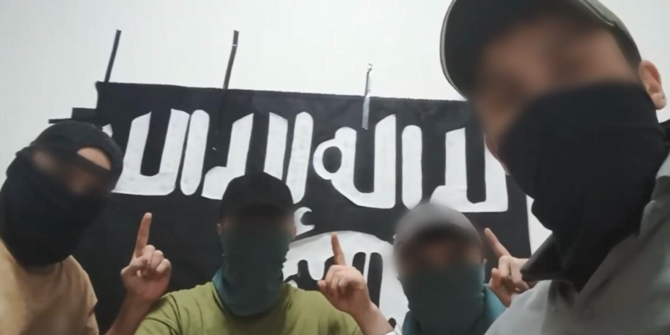
- The suspects are charged with founding a terrorist organization, among other things
- They intended to carry out high-profile attacks in Germany and Western Europe
BERLIN: Germany has charged six foreign nationals for allegedly plotting terrorist attacks on behalf of the Daesh Province of Khorasan (Daesh-K), the federal prosecutor’s office said on Wednesday.
The suspects, identified as Tajik citizens Mukhammadshujo A., Nuriddin K., Shamshud N., Said S., Raboni Z., and Kyrgyz citizen Abrorjon K., are charged with founding a terrorist organization, among other things.
They intended to carry out high-profile attacks in Germany and Western Europe but had no concrete plan when law enforcement intervened, according to the statement.
The suspects, who were arrested in July last year, had been in touch with Daesh-K, the Afghan offshoot of Daesh, which claimed responsibility for a mass shooting in Moscow last month in which at least 137 people were killed.
According to investigators, the suspects arrived in Germany via Ukraine after war broke out there in spring 2022, and formed a terrorist cell together with another member from the Netherlands.
They met regularly to discuss their intentions and scouted potential locations in Germany, the prosecutors’ statement said.
UK police arrest three over migrants’ deaths in Channel
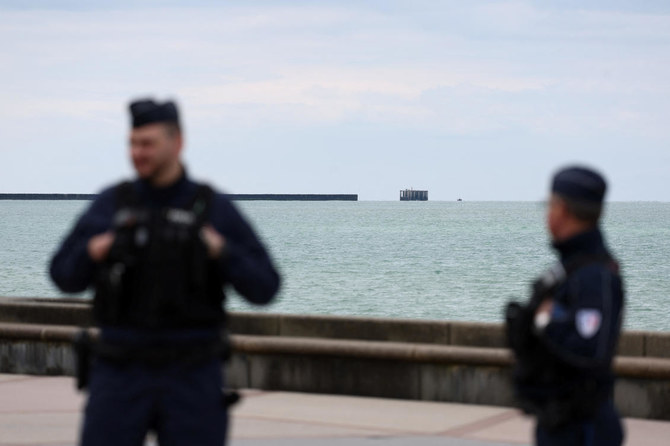
- The men, two Sudanese nationals aged 22 and 19, and a South Sudan national aged 22, were detained
- Suspects were arrested on suspicion of facilitating illegal immigration and entering the UK illegally
LONDON: British police said on Wednesday they had arrested three men over the deaths of five migrants including a child who died attempting to cross the Channel from France the day before.
The deaths occurred when a small overcrowded boat carrying 112 people set out to cross one of the busiest shipping lanes in the world and panic took hold among the passengers not far from the shore.
Rescuers picked up about 50 people, with four taken to hospital, but others stayed on the boat, determined to get to Britain.
Three men, two Sudanese nationals aged 22 and 19, and a South Sudan national aged 22, were detained on Tuesday night on suspicion of facilitating illegal immigration and entering the UK illegally, the National Crime Agency (NCA) said.
“This tragic incident once again demonstrates the threat to life posed by these crossings and bring into focus why it is so important to target the criminal gangs involved in organizing them,” said NCA Deputy Director of investigations Craig Turner.
“We will do all we can with partners in the UK and France to secure evidence, identify those responsible for this event, and bring them to justice.”
French police are also continuing to investigate the circumstances surrounding the incident, alongside their British counterparts, the NCA said.
It added 55 people who were believed to have been on board the boat which arrived in Britain had also been identified.
More than 6,000 people have arrived in Britain this year via small, overloaded boats — usually flimsy inflatable dinghies — that risk being lashed by the waves as they try to reach British shores.
The deadly crossing on Tuesday took place just hours after the British parliament passed a bill paving the way for asylum seekers who arrive in Britain without permission to be deported to Rwanda, a policy which Prime Minister Rishi Sunak argues will deter people from making the dangerous cross-Channel journey.



